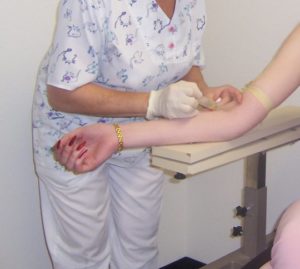WHEN TO GET TESTED FOR HIV?
According to the Centers for Disease Control and Prevention , one in seven people with HIV don’t know that they are infected. For this reason, they recommend that everyone between the age of 13 and 64 has at least one HIV test, but people in higher risk groups may need to be tested more often. Your gynecologist can help you make smart decisions about HIV testing that are right for you. Keep these general guidelines in mind as you consider getting tested for HIV.

After Unprotected Sex
Having unprotected sex outside of a monogamous relationship with a non-infected partner leaves you vulnerable to HIV. Because HIV does not show up in the blood stream right away, you can’t get tested immediately after your potential exposure. In most cases, HIV will show up in a test three months after the last potential exposure event, though your gynecologist may recommend repeating the test at the six-month mark for maximum accuracy. Keep in mind that unprotected sex means any instance of vaginal, anal, or oral sex without protection.
After Sharing Needles
Sharing needles with an injected person, such as syringes used for drugs, also increases your risk. Like HIV testing after unprotected sex, you will need to be tested three months after your last potential exposure, and in some cases, again six months after exposure. Keep in mind that if you continue to share needles, you will need to have more regular HIV testing.
After Exchanging Sex for Drugs or Money
Exchanging sex puts you at risk of exposure to HIV from people with high-risk lifestyles. The same testing window applies. Talk to your gynecologist after this kind of sexual activity, as he or she may recommend additional STD testing.
At Washington Surgi-Clinic, we offer confidential HIV testing in Washington, D.C. , alongside a range of gynecology services and STD treatment options. To learn more about HIV testing and our other services, please call (202) 659-9403.
